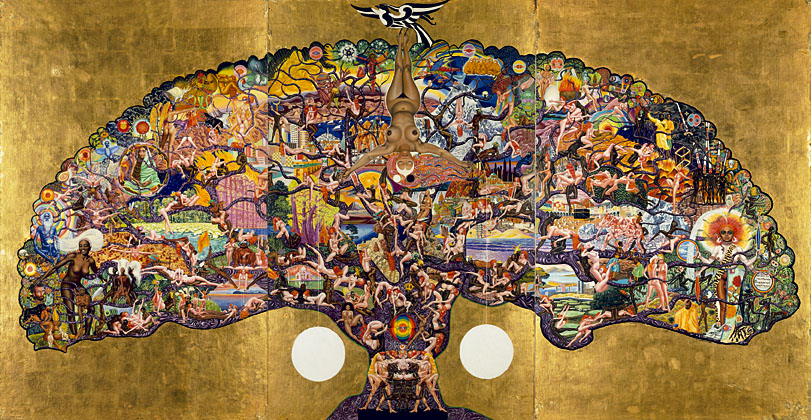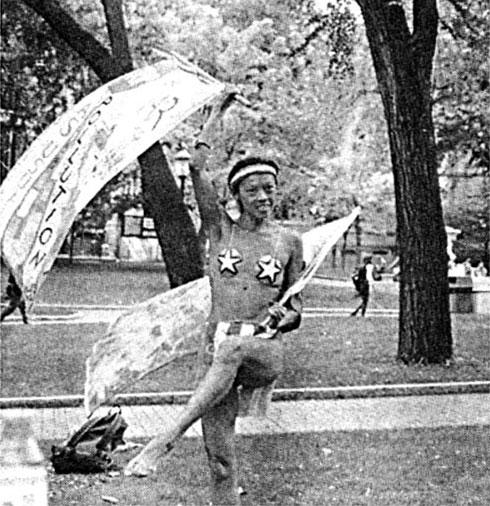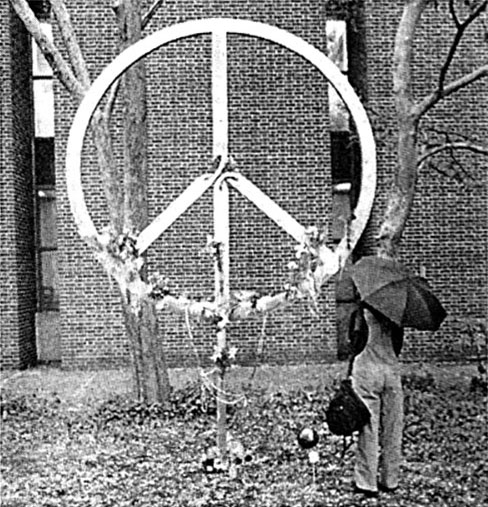Atmospherics
2005 | maarifa street
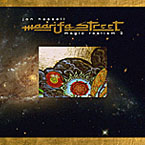
Go up on the roof at night
in this city of the soul.
Let everyone climb on their roofs
and sing their notes!
Sing loud!
–Jelaluddin Rumi (1207-1273)

Touchstones
1
A clipping from the New York Times, 17 April 2003, which mentions a “Maarifa Street” in Qualat Sukkar, Iraq. In Arabic, “maarifa” means “knowledge/wisdom”. I thought to myself, what could be more pertinent today than asking what kind of answers might suggest themselves by putting “wisdom” and “Arabic” together? Why isn’t the “street of wisdom” the yes-to-life poetry of Rumi’s ecstatic vision instead of the no-to-life piety of fundamentalists East and West?
Out beyond ideas of wrongdoing and rightdoing,
there is a field. I’ll meet you there.
–Rumi
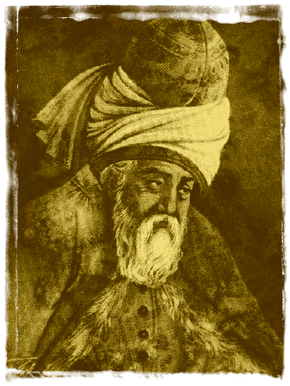
about rumi
JALAL AL-DIN MUHAMMAD RUMI or Jalal al-Din Muhammad Balkhi (also known as Mowlavi or Moulana, meaning my guide in Iran, India and Pakistan or Mevlana meaning our guide in Turkey) (September 30, 1207 – December 17, 1273 CE) was a Persian poet and Sufi mystic, who was born in Balkh (then a city of the greater Khorasan province, Persia at that time, present Afghanistan) and died in Konya (present Turkey, then within the Seljuk Empire’s territory). When the Mongols invaded Central Asia, his father (Baha’al din Veled) set out to Konya, Anatolia within the westernmost territories of Seljuk Empire. Rumi was 18 years old at that time. Rumi was sent to Damascus and Aleppo to obtain religious education. His father became the head of a Madarassah (religious school) and when his father died Rumi succeeded him, at the age of 25. He was trained in the religious and mystical doctrines by Syed Burhan al-Din but it was his meeting with the dervish Shams Tabraiz that changed his life completely. Rumi spent most of his later years of life in Anatolia and also completed his masterpiece there. He died on December 17, 1273 in Konya in present day Turkey; Rumi was laid to rest beside his father, and a splendid shrine was erected over his remains.
teachings of rumi
His doctrine advocates unlimited tolerance, positive reasoning, goodness, charity and awareness through love. To him and his disciples, all religions are more or less true. Looking with the same eye on Muslim, Jew, Buddhist and Christian alike, his peaceful and tolerant teaching has appealed to men and women of all sects and creeds. The 13th century Mevlana Mausoleum with its mosque, dance hall, dervish living quarters, school and tombs of some leaders of the Mevlevi Order continues to this day to draw pilgrims from all parts of the Muslim and non-Muslim world. The Mevlevi,”The Whirling Dervishes” or Mevleviye, are one of the most well-known of the Sufi orders. It was founded in 1273 by Rumi’s followers after his death, particularly by his son, Sultan Veled Celebi.
major works
Rumi’s major work is “Masnavi-ye Manavi” (Spiritual Couplets), a six-volume poem regarded by many Sufis as second in importance only to the Koran. In fact the Masnavi is often called “Qor’an-e-Farsi” (The Koran in Persian). It is considered by many to be one of the greatest works of mystical poetry. Rumi’s other major work is the “Diwan-e Shams-e Tabriz-i” (The Works of Shams of Tabriz—named in honor of Rumi’s great friend and inspiration, the dervish Shams), comprising some 40,000 verses. Both works are among the most significant in all of Persian literature. It is believed by some that Shams was murdered by disciples of Rumi who were jealous of his relationship with Shams (also spelt Shems).
influence
Rumi’s importance transcends national and ethnic borders. Speakers of the Persian language in Iran, Afghanistan and Tajikistan see him as one of their most significant classical poets and an influence to many poets though history. He has also had a great influence on Turkish literature throughout the centuries. His poetry forms the basis of much classical Iranian and Afghan music. Contemporary classical interpretations of his poetry are made by Mohammad-Reza Shajarian (Iran), Shahram Nazeri (Iran) and Ustad Mohammad Hashem Cheshti (Afghanistan). To many modern Westerners, his teachings are one of the best introductions to the philosophy and practice of Sufism. Pakistan’s National Poet, Allama Dr. Muhammad Iqbal (November 9, 1877-April 21, 1938) called Rumi his spiritual leader and got inspiration from his poetry. Therefore Dr Iqbal addressed him as Pir Rumi in his Urdu and Persian poems.
(From the Wikipedia.)
Dance, as though no one is watching,
Love, as though you’ve never been hurt before,
Sing, as though no one can hear you,
Work, as though you don’t need the money,
Live, as though heaven is on earth.
–Rumi
collections of writings by rumi
Open Secret: Versions of Rumi, JOHN MOYNE, COLEMAN BARKS
Threshold Books ISBN: 0939660067 (1983)
The Essential Rumi-by Jalal Al-Din Rumi, John Moyne, A. J. Arberry, Reynold Nicholson, Jelalludin Rumi
Castle Books ISBN: 078580871X (1997)
The Illuminated Rumi by JALAL AL-DIN RUMI, MICHAEL GREEN (Contributor), COLEMAN BARKS (Translator)
Broadway ISBN: 0767900022
2

• One frame of video (above) from that last summer, after dinner at Mati’s house, both of us standing in front of ‘Crucifixion’, letting the camera roam over the surface in close-up with the ambient light revealing the topography of the paint. That frame is not only a capture of the painting (even this tiny detail radiates an energy that is at once cosmic and earthy) but also of that precious off-camera moment.
Even this tiny detail radiates an energy that is at once cosmic and earthy and its juxtaposition within the vastness of the Hubble image of two galaxies passing in the night reminds me of a piece of primitive art which is thought to be an attempt to illustrate some enigmatic birth or death in the skies of prehistory—the ultimate “street of wisdom.”
3
My 1983 record, Aka-Darbari-Java / Magic Realism, a fantasy mosaic that stretched across geography and time with the sounds of Pygmies, Javanese gamelan and Hollywood orchestrations from the fifties. (Graced by another beautiful Mati Klarwein painting, ‘Soundscape’, from 1982.) In many ways Maarifa Street gives off some of the same atmosphere and inspired me to subtitle it Magic Realism 2.
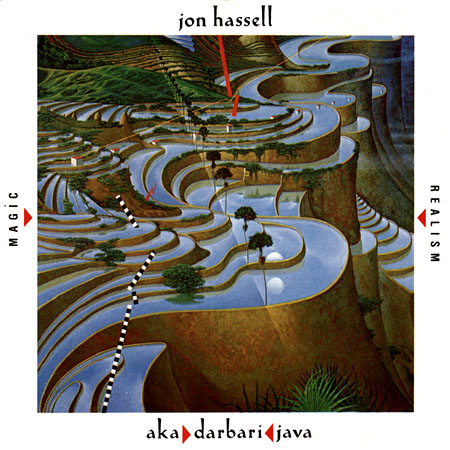
From the album notes
MAGIC REALISM
• Like the video technique of “keying in” where any background may be electronically inserted or deleted independently of foreground, the ability to bring the actual sound of musics of various epochs and geographical origins all together in the same compositional frame marks a unique point in history.
• A trumpet, branched into a chorus of trumpets by computer, traces the motifs of the Indian raga DARBARI over Senegalese drumming recorded in Paris and a background mosaic of frozen moments from an exotic Hollywood orchestration of the 1950’s (a sonic texture like a “Mona Lisa” which, in close up, reveals itself to be made up of tiny reproductions of the Taj Mahal), while the ancient call of an AKA pygmy voice in the Central African Rainforest—transposed to move in sequences of chords unheard of until the 20th century—rises and fails among gamelan-like cascades, multiplications of a single “digital snapshot” of a traditional instrument played on the Indonesian island of JAVA, on the other side of the world.
• Music which is to this degree self-referential, in which larger parts are related to and/or generated from smaller parts, shares certain qualities with “white” classical music of the past.
AKA/DARBARI/JAVA is a proposal for a “coffee-colored” classical music of the future—both in terms of the adoption of entirely new modes of structural organisation (as might be suggested by the computer ability to re-arrange, dot-by-dot, a sound or video image) and in terms of the expansion of the “allowable” musical vocabulary in which one may speak this structure—leaving behind the ascetic face which Eurocentric tradition has come to associate with serious expression.
jon hassell—1983
4
• A 3×5 index card with the words: “Rumi and Gil Evans: together again”; a notated melodic motif from ‘Open Secret (Paris)’ and notes about the Tibetan word “drala” which relates to the magic in the unmediated simplicity of nature. “A simple raindrop of a melody” is written underneath. This opened the door to seeing that simple melody as if it were some natural phenomenon, no apologies required. Dra means “enemy” and la means “above”. So “drala” literally means “beyond the enemy.” My note in the margin: “Cultural Alchemy!—’maarifa’ (Arabic) + ‘drala’ (Tibetan)”.
5
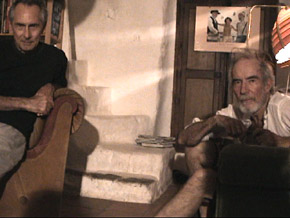
• The recording that August night in 1985: wandering gamelans of sheep bells tinkling in the hills above Deia. Listening to this at the end of ‘Open Secret (Paris)’ opens up a world of memories and reminds me how much of this record comes out of that atmosphere and that moment.
And the biggest
touchstone of all
Maarifa Street is yours, my brother Mati. I’m still trying to do the soundtrack to your clairvoyant painting and self, always the close-up and the long-shot, the physical and the metaphysical, at once. Hope you like the coda with the sheep bells. Can’t listen to it without thinking of the nightly serenade that surrounds you there on the hill.
3×5 background notes
In the shower, or falling asleep, or making dinner, or any place where I suddenly come upon a succinct way of saying something (either in words or music), I jot it down on a 3×5 index card (see Touchstones 1 and 4).
Here are a few (unedited) 3x5s that came to me during the making of Maarifa Street:
24jan05
“FUSION” CUISINE vs.”FUSION” MUSIC
Before the 2002 Montreal Jazz Festival concert
from which some of the Maarifa Street music
came, we ate at a “fusion cuisine” restaurant
called Kiwi. Something like watermelon and tomato salad was on the menu and it occurred to me that this
type of dish—surprise combinations of familiar
elements—was not a bad metaphor for the sort of
music that we were doing (especially the track called
‘Maarifa Street’). But while fusion cuisine
seems open ended with possible combinations,
the use of “fusion” to describe music has become a dirty word, narrowly defined to mean jazz merged with rock elements (a style which soon became cliché).
So imagine a music which is more like fusion cuisine—
with a much bigger menu of choices.
9may04
With Maarifa Street:
I’m trying to make something
which will be both
“familiar” and “strange.”
The unsubtle mind, fed on
prefab, pre-labeled “product”
will probably not be able to see beyond
the “familiar.
29mar04
Yes, “avoidance” is certainly
a feature of personal style:
what you choose NOT to do…
but a time comes when
avoidance of avoidance
is a good thing to try out.
P.S. to above: How does this relate to Maarifa
Street? I’m thinking of my previous avoidance
of the too-often-used texture of an Arabic
voice soaring above some funk/disco beat and
how Dhafer’s passionate authenticity blew away
that connection for me. After all, THAT soaring
Arabic voice has not been heard over THIS texture
anyway!
24jan05
“FUSION” CUISINE vs.”FUSION” MUSIC
Before the 2002 Montreal Jazz Festival concert
from which some of the Maarifa Street music
came, we ate at a “fusion cuisine” restaurant
called Kiwi. Something like watermelon and tomato salad was on the menu and it occurred to me that this
type of dish—surprise combinations of familiar
elements—was not a bad metaphor for the sort of
music that we were doing (especially the track called
‘Maarifa Street’). But while fusion cuisine
seems open ended with possible combinations,
the use of “fusion” to describe music has become
a dirty word, narrowly defined to mean jazz merged
with rock elements (a style which soon became cliché).
So imagine a music which is more like fusion cuisine—
with a much bigger menu of choices.
9oct04
HOW TO MAKE AL-QUAEDA STOCK PLUMMET?
“Rumi-Not-Osama”
T-shirts
(with a different verse of Rumi on each)
The Islamic world needs to go thru
a hippie-like transformation via
appeal to the young spirit.
29may03
The difference between
a “joke”—
pre-prepared, armed with a punch line
and “humor”—
the art of spinning something out of present circumstances
is like the difference between
“classical” and
“improvised” music.
The experience is quite different.
31may03
Some of us have discovered a ceiling
on tolerance for the kind of mental world that seems to be created by the
pursuit of fame in the EGN (Era of Great Numbers).
Big Ambition (as in “big government”),
detours the more important search for Paradise.
And some have realized that flying low— under
the radar— leaves more space for that search.
9aug03
When will a really good writer latch on to the subtlety?
“Occasionally someone will allude to
the French being ruled by forms and appearances
while Americans are governed by impulses and desires:
the clash is between freedom and cultivation…”
(A.O. Scott NYT 8aug03 re: “le Divorce”)
The Milan concert (among others)
reflects a beautiful example of
the ongoing search for balance
between freedom and cultivation.
I’ve gone beyond work which takes as its subject
the questioning of the nature of music, of sound, and find myself content to try to create something beautiful
within certain givens.
I have more fun listening to Ravel or Duke Ellington
than LaMonte Young (though to be fair, I’ve had great
revelations from both).
(And I prefer porn to poetry until I see poetic porn.)
31may03
Some of us have discovered a ceiling
on tolerance for the kind of mental
world that seems to be created by the
pursuit of fame in the EGN (Era of Great Numbers).
Big Ambition (as in “big government”),
detours the more important search for Paradise.
And some have realized that flying low— under
the radar— leaves more space for that search.
31may03
Some of us have discovered a ceiling
on tolerance for the kind of mental
world that seems to be created by the
pursuit of fame in the EGN (Era of Great Numbers).
Big Ambition (as in “big government”),
detours the more important search for Paradise.
And some have realized that flying low— under
the radar— leaves more space for that search.
31may03
Some of us have discovered a ceiling
on tolerance for the kind of mental
world that seems to be created by the
pursuit of fame in the EGN (Era of Great Numbers).
Big Ambition (as in “big government”),
detours the more important search for Paradise.
And some have realized that flying low— under
the radar— leaves more space for that search.
MARKER— DEC 2003
I no longer care about The Commentary:
jazz, new age, has-been, will-be, is-becoming—
whatever—this is simply, “Here’s what I’ve done,
what I was doing then” and “Here’s what I’m doing now.” I don’t expect more than ten thousand people in the world to pay the attention that would
allow them to “get it.” After all, if those 10k
people all lived in the same village with me, that would make a helluva parade and a nice party at home with my friends and family.
5jul03
Play it
As if “Jazz”
were a melting Dali.
24jun03
JH catalog:
from unnoticed to “classic”
without having passed through “success.”
(paraphrase of George Axelrod re: his Manchurian Candidate.)
11jun03
Young people:
addicted to music—
like “substance abuse”—
too much of a good thing—
the gourmand over the gourmet.
Good Friday apr03
THE FELLINI DOOR
Hearing Miles play ‘My Ship’ in the
Gil Evans arrangement at Montreux in 1991
I cried out for you.
Hearing you enmeshed in that shimmering beauty
once again, in the last years of your life
reminds of
Mastroianni and Anita Ekberg in Fellini’s Intervista—
Their old selves, talking and laughing
while their
young selves (in La Dolce Vita) are projected onto them.
